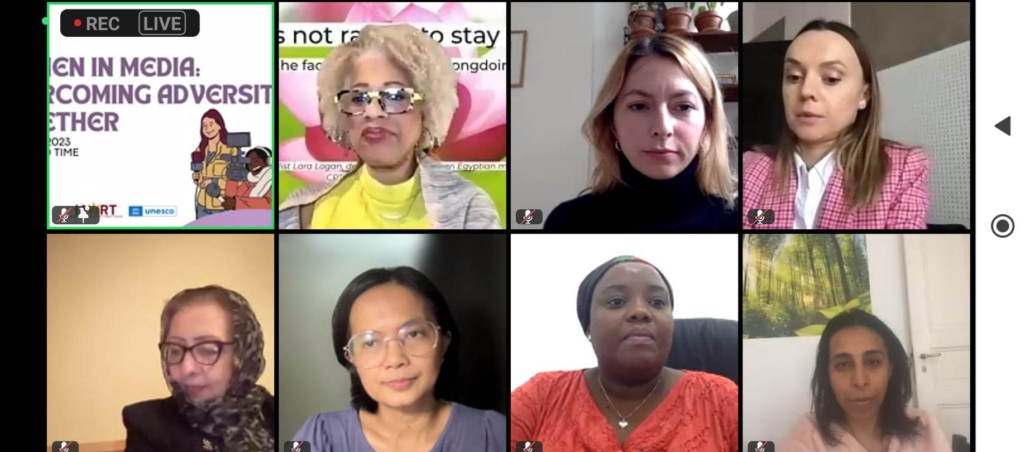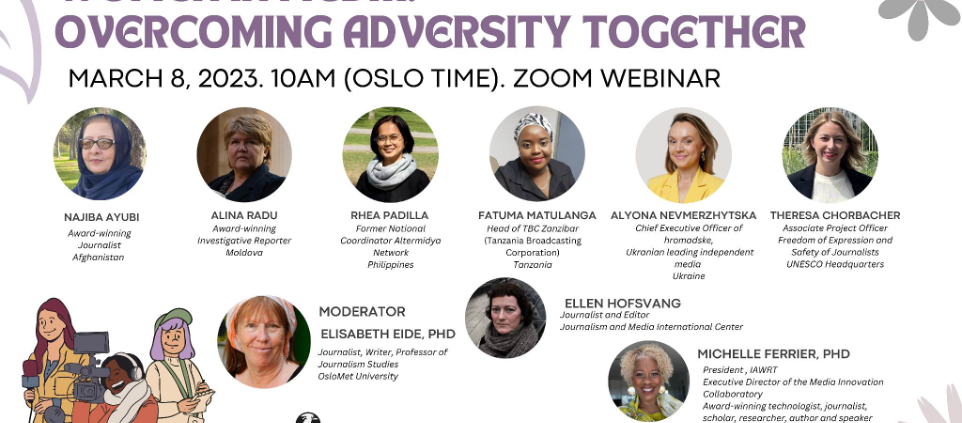Women in Media: Overcoming Adversity Together
By Maria Solita J. Virtudazo
On March 8, 2023, on the historic 113th year of the International Women’s Day commemoration, the International Association of Women in Radio and Television (IAWRT) in partnership with Journalism and Media International Center of OsloMet University in Norway, and in collaboration with UNESCO Headquarters, gathered, via Zoom, 69 women-journalists, media workers, and academics across the globe to highlight their stories and honor their courage, heroism, and resilience.
The online discussion-solidarity meeting aptly titled, Women in Media: Overcoming Adversity Together, opened with an introductory message from IAWRT President Dr. Michelle Ferrier. Dr. Elisabeth Eide, journalist, writer, and professor of Journalism Studies at OsloMet University in Norway was the moderator.
Five principled and intrepid women journalists, namely, Najiba Ayubi (Afghanistan), Alina Radu (Moldova), Alyona Nevmerzhytska (Ukraine), Rhea Padilla (Philippines), and Fatuma Matulanga (Tanzania) lent their voices on behalf of their colleagues. Each of them shared how they and other women journalists in their respective countries bravely stood against and endured oppression, war, armed conflict, red-tagging, political persecution and incarceration, radicalization and extremism, online trolling, hate speech, physical and sexual assault, among other forms of abuse.

Najiba Ayubi is an Afghan multi-awarded journalist, and human rights and press freedom activist. She is a recipient of the 2013 Courage in Journalism Award from the International Women’s Media, and was named one of the 100 Information Heroes by Reporters without Borders (Reporters sans frontières) in 2014. She lamented how Islamic extremism has been oppressive and destructive to women journalists, and women, in general, since the Taliban returned to power. She cited thousands of Afghans who fled the country at all costs to preserve their life. Unfortunately, some lost their lives in an attempt to save it. One of whom is an asylum seeker and journalist Torpekai Amarkhel, who was onboard a fleeing boat that capsized near Italy. Ms. Ayubi is the head of IAWRT Afghanistan Chapter and is also in exile in the United States.
Another award-winning investigative journalist from Moldova and managing director of the country’s independent newspaper Zairul de Garda (The Guard Newspaper) is Alina Radu. She shared how women journalists in their country have been marginalized and isolated. Facebook (FB) or Metaverse is inaccessible in Moldova. Thus, she enjoined FB to be sympathetic to women journalists and provide them access to social media, which has been tightly controlled by the government. Ms. Radu currently heads IAWRT Moldova Chapter.
Prominent Ukrainian journalist Alyona Nevmerzhytska, Chief Executive Officer (CEO) of media outfit hromadske, explained that while their culture is not particularly oppressive to women, however, things went on a downward spiral since the Russian invasion in February 2022. The incessant air strikes and attacks on the country’s major cities triggered the exodus of around 5 million Ukraine nationals, mostly women and children. Those who remain in the country have to endure extreme living conditions and the ravages of war.
The Philippines’ Rhea Padilla, former National Coordinator of the People’s Alternative Media Network (Altermidya) deplored the red-tagging, political persecution, intimidation, and even killing of women journalists and media personalities. She raised the case of Tacloban City-based journalist and IAWRT member Frenchie Mae Cumpio, who has been in jail for over three years now for trumped-up charges of illegal possession of firearms and explosives, and terrorist financing. Ms. Cumpio was among the “Tacloban 5” human rights defenders who were raided and arrested at midnight of February 7, 2020. Her arrest and continued detention speak of insidious yet blatant attacks against journalists in the country, aimed at intimidating and silencing those who are critical in their reporting. Ms. Padilla then called on government authorities for the immediate release of Ms. Cumpio and colleagues.
Journalist Fatuma Matulanga is the CEO of Tanzania Broadcasting Corporation in Zanzibar and IAWRT Tanzania’s Chapter head. She shared how women in their country have been disproportionately represented in media. Most Media Studies graduates and professionals ended up as PR officers and spokespersons. Women have been marginalized and paid less than their male counterparts, and are in dire need of training and retooling.
Theresa Chorbacher of the United Nations Educational, Scientific and Cultural Organization (UNESCO) Paris talked about the organization’s mandate to work on press freedom and its various legal, policy-making, and capability-building initiatives to promote the safety of women journalists worldwide, and address the issue of impunity. In 2022, UNESCO published “The Chilling”, a report of a three-year intensive study on online violence against women journalists in 15 countries, conducted by researchers from the US-based International Center for Journalists (ICFJ) and the UK-based Centre for Freedom of the Media (CFOM). The report sheds light on the “evolving challenges faced by women journalists, identifies political actors as top perpetrators of online violence against women journalists using popular social media platforms, maps out the online-offline violence trajectory, and offers practical recommendations for intergovernmental organizations, States, Big Tech, the news industry, legal and judicial actors, and civil society”. Truly, the adversities faced by women journalists in and out of the newsroom may seem daunting and insurmountable. But we can overcome it if we unite and work together in this fight.








